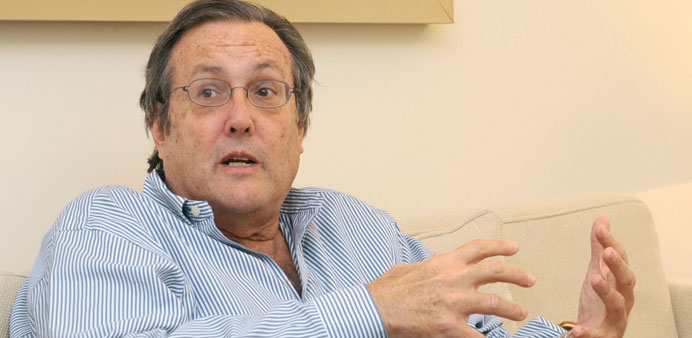By Zia Khan/Staff Reporter
An American research institute that measures the social, political and economic impact of Internet on states and societies across the globe is planning to launch maiden project in Qatar, a country with the highest ratio of smartphone penetration and the fastest growing economy in the world.
The World Internet Project (WIP) is looking for a partnership with the Northwestern University Qatar to undertake the study that may help the country craft policies for the future to further develop communication technologies.
Jeffery I. Cole, director of Centre for the Digital Future, is in Doha to prepare the ground for the collaboration with the WIP and the local academic institute to kick start the initiative that would also help understand how technology is changing lifestyle in Qatar.
“We are present in the Arab Islamic world and will like to take start in Qatar…it is a highly developed country with Internet penetration as high as 80%,” he said in an exclusive interview with the Gulf Times.
Jeffery, whose centre is associated with the Annenberg School of Communication of the University of Southern California, is also scheduled to discuss the fourth edition of the world Internet report today evening.
Jeffrey has been at the forefront of media and communication technology issues both in the United States and internationally for the past 25 years.
An expert in the field of technology and emerging media, Cole serves as an adviser to governments and leading companies around the world as they craft digital strategies.
The World Internet Project originated at the UCLA Centre for Communication Policy (now the USC Annenberg School Centre for the Digital Future) and was founded with the NTU School of Communication Studies in Singapore and the Osservatorio Internet Italia at Bocconi University in Milan, Italy.
The American researcher said the Internet and the social networking is changing the human life, thinking, pattern of living and transforming societies more than ever in the history and it is high time to understand the impact of technology.
The WIP, he explained, is already present in countries like UAE and Iran besides in the American continent, parts of Europe and other Asian region.
With almost one-third of the world population having exposure to the technologies like smartphones and Internet and advent of social networking, Cole said, the role of technology as an agent of change is likely to increase manifold in near future.
“This can turn the world upside down…nobody can shy away from the impact of the Internet,” said Cole, who is the brain behind the project that was launched in the United States 13 years ago and is now present in all continents.
Qatar, he said, needs to understand the footprint of technology on the state and the society more than any other country because of an exorbitant ratio of smartphone penetration which is as high as 240%, according to locally gathered data.
Giving his personal opinion as an expert, Cole said he foresees almost everybody in the world having exposure to at least a mobile phone in less than a decade from now.
“By not later than 2020, we can have 6bn human beings using the wonderful little device…I won’t be surprised if farmers in remote parts of the African continent start using cell phones for crop pricing,” he added.

Dr Jeffery Cole at the interview.
